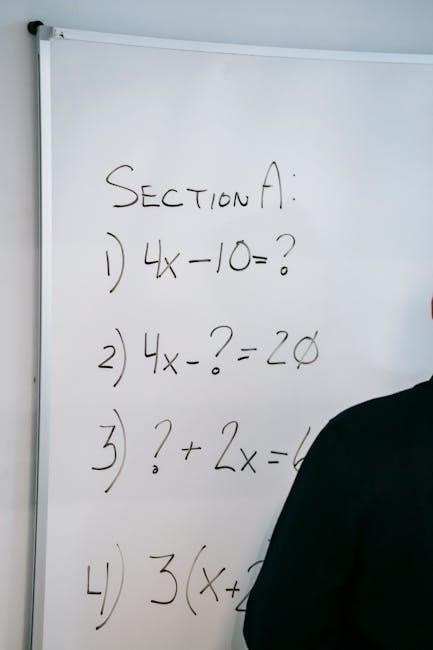College math questions and answers PDFs are essential resources for students, offering a comprehensive collection of problems and solutions. They cover various math topics, providing clear explanations and step-by-step solutions to help students master concepts. These PDFs are designed to enhance problem-solving skills, critical thinking, and exam preparation, making them invaluable for academic success in mathematics.

Overview of College Math Resources
College math resources encompass a wide range of materials designed to aid students in mastering mathematical concepts. These include practice problem sets, solution manuals, and study guides that cover various math topics. Many resources focus on enhancing problem-solving skills through structured exercises and real-world applications, making complex concepts more accessible. For instance, CBSE competency-based questions provide assessments that gauge learning and offer valuable feedback on instructional methods. Similarly, ACT math sections feature complex question types like Integrating Essential Skills, which require a comprehensive understanding and application of knowledge. These resources are invaluable for students seeking to improve their mathematical proficiency and prepare effectively for exams, ensuring they are well-equipped for academic success.
Importance of Practice Materials in Math Education
Practice materials are indispensable in math education, serving as tools to reinforce understanding and build problem-solving skills. They provide students with hands-on experience, enabling them to apply theoretical concepts to real-world problems. Regular practice helps identify knowledge gaps and strengthens mathematical reasoning. Resources like worksheets, past papers, and solution guides offer structured learning opportunities. For instance, CBSE competency-based questions and ACT math sections emphasize complex problem-solving, preparing students for challenging scenarios. Consistent practice fosters confidence, improves accuracy, and enhances critical thinking abilities. By utilizing these materials, students can track their progress and develop a deeper grasp of mathematical principles, ultimately excelling in their academic and professional pursuits.
Benefits of Using PDF Format for Study Materials
The PDF format offers numerous advantages for study materials, particularly in college math education. It ensures that content remains consistent and accessible across different devices, maintaining formatting and clarity. PDFs are easily shareable and portable, allowing students to study anywhere without relying on internet connectivity. They also support search functionality, enabling quick access to specific topics or problems. Additionally, PDFs are cost-effective and environmentally friendly, reducing the need for physical copies. Many educational resources, like CBSE competency-based questions and ACT math sections, are available in PDF format, making them widely accessible. This format is ideal for creating organized, visually appealing study guides that enhance learning experiences.

Types of College Math Questions
College math questions vary widely, including algebra, calculus, statistics, and geometry problems. They often involve multiple-choice, problem-solving, and proof-based formats, assessing critical thinking and analytical skills effectively.
Algebra Questions and Solutions
Algebra is a fundamental area of mathematics, and college-level questions often involve solving equations, functions, and graphs. These problems require a strong understanding of variables, expressions, and abstract thinking. Common topics include linear equations, quadratic equations, polynomials, and rational expressions. Practice materials, such as PDF resources, provide step-by-step solutions to these problems, helping students grasp concepts like factoring, simplifying, and solving systems of equations. Competency-based questions, as seen in CBSE and ACT math sections, emphasize critical thinking and problem-solving skills. Regular practice with algebra questions and answers is essential for building a solid foundation in mathematics, which is crucial for advanced studies in fields like physics, engineering, and computer science.
Calculus Questions and Answers
Calculus is a core subject in college math, focusing on limits, derivatives, and integrals. Questions and answers PDFs provide detailed solutions to problems involving functions, graphs, and applications. These resources cover key topics like differentiation rules, optimization, and integration techniques, offering step-by-step explanations. They also address advanced concepts such as series, differential equations, and multivariable calculus. PDF materials are particularly useful for understanding complex problems and preparing for exams. By practicing with these resources, students can improve their analytical skills and apply calculus to real-world scenarios in fields like physics, engineering, and economics. Regular practice with calculus questions and answers is essential for mastering this foundational area of mathematics.
Statistics and Probability Questions
Statistics and probability questions in college math PDFs cover essential topics like data analysis, probability distributions, and hypothesis testing. These resources provide clear explanations and solutions to problems involving descriptive statistics, inferential statistics, and probability theory. Students can practice calculating measures of central tendency, understanding normal distributions, and applying probability rules. The PDFs also include questions on advanced topics such as regression analysis, correlation, and Bayesian probability. By solving these problems, students improve their ability to interpret data, make informed decisions, and apply statistical methods to real-world scenarios. Regular practice with these questions enhances critical thinking and prepares students for exams and practical applications in fields like social sciences, healthcare, and engineering.
Geometry and Trigonometry Problems
Geometry and trigonometry problems in college math PDFs are designed to test spatial reasoning, understanding of shapes, and mastery of trigonometric identities. These resources include questions on properties of triangles, circles, and polygons, as well as advanced topics like spherical geometry and coordinate systems. Trigonometry questions focus on angles, wave functions, and applications in physics and engineering. Students can practice solving proofs, calculations, and real-world applications, enhancing their ability to visualize and analyze geometric and trigonometric relationships. Regular practice with these problems helps build a strong foundation for understanding more complex mathematical concepts and prepares students for exams and practical applications in various fields.

Popular College Math Topics Covered in PDFs
College math PDFs cover essential topics like linear algebra, calculus, statistics, and discrete mathematics. They provide detailed explanations, examples, and solutions to common problems, ensuring comprehensive understanding.
Linear Algebra and Its Applications
Linear algebra is a fundamental area of mathematics, focusing on vectors, matrices, and their operations. College math PDFs provide extensive coverage of this topic, offering questions and detailed solutions to problems involving vector spaces, linear transformations, and matrix operations. These resources are essential for understanding concepts like determinants, eigenvalues, and eigenvectors, which are critical in various fields such as engineering, physics, and computer science. Additionally, the PDFs often include applications of linear algebra in real-world scenarios, such as solving systems of equations, analyzing data, and modeling complex systems. By practicing these problems, students can enhance their problem-solving skills and gain a deeper understanding of the subject.

Differential Equations and Their Solutions
Differential equations are a cornerstone of college mathematics, focusing on equations that relate a function to its derivatives. College math PDFs provide a wealth of questions and answers, covering both ordinary and partial differential equations. These resources are designed to help students grasp key concepts such as separable equations, integrating factors, and systems of equations. The solutions often include detailed step-by-step explanations, making complex problems more accessible. Additionally, PDFs frequently incorporate real-world applications, such as modeling population growth or heat transfer, to illustrate the practical relevance of differential equations. By working through these problems, students can improve their analytical and problem-solving abilities, essential for advanced studies in fields like engineering and physics.
Discrete Mathematics and Combinatorics
Discrete mathematics and combinatorics are fundamental areas of study in college math, focusing on structures that are fundamentally discrete rather than continuous. College math PDFs offer a wide range of questions and answers covering key topics such as logic, set theory, graph theory, combinatorics, and probability. These resources provide detailed solutions to problems involving permutations, combinations, binomial coefficients, and recurrence relations. Additionally, they explore applications in computer science, cryptography, and data analysis. The questions are designed to enhance problem-solving skills and logical reasoning, while the answers offer clear explanations to help students master these concepts. By practicing these problems, students gain a strong foundation for advanced studies in mathematics and computer science.
Mathematical Analysis and Proof Techniques
Mathematical analysis and proof techniques are central to advanced college math, focusing on rigorous mathematical reasoning and problem-solving. College math PDFs provide a wealth of questions and answers that delve into core topics such as limits, continuity, differentiation, and integration. These resources also emphasize the development of proof-writing skills, including direct proofs, induction, and proof by contradiction. Students can practice solving complex problems related to sequences, series, and multivariable calculus, with detailed step-by-step solutions. The PDFs also cover advanced topics like real analysis and abstract algebra, ensuring a deep understanding of theoretical concepts. By mastering these techniques, students build a strong foundation for higher-level mathematics and develop critical thinking skills essential for STEM fields.

Study Strategies for College Math
Effective study strategies for college math involve active learning, consistent practice, and organized review. Utilize PDF resources for problem-solving, focus on understanding concepts, and manage time wisely for exams and homework. Regularly review notes, seek clarification on doubts, and apply mathematical concepts to real-world scenarios to reinforce learning. Prioritize difficult topics, use flashcards for formulas, and collaborate with peers or tutors for better comprehension. Develop a study schedule and stick to it, ensuring adequate practice with sample questions and past papers to build confidence and proficiency in math.
Effective Problem-Solving Techniques
Effective problem-solving techniques are crucial for mastering college math. Start by understanding the problem fully, identifying key information and what is being asked. Break complex problems into simpler, manageable parts, and tackle each step systematically. Use visualization tools like graphs or diagrams to aid comprehension. Practice applying formulas and concepts to real-world scenarios to deepen understanding. Regularly review mistakes to identify patterns and improve. Employ active learning strategies, such as explaining problems aloud or teaching concepts to others. Utilize practice materials, like college math PDFs, to refine skills through diverse question types. Consistent practice and critical thinking are key to excelling in math problem-solving.
Time Management for Math Exams
Effective time management is critical for success in college math exams. Allocate time wisely, spending no more than 2-3 minutes per question to avoid falling behind. Prioritize problems based on difficulty and your confidence level, starting with simpler questions to secure easy points. For complex questions, like those in the ACT’s Integrating Essential Skills category, budget extra time to ensure thorough problem-solving. Practice with timed exercises using college math PDFs to build speed and accuracy. Regularly review mistakes to identify time-wasting patterns and improve efficiency. By mastering these strategies, students can reduce stress, complete exams confidently, and achieve better results. Consistent practice is key to refining time management skills.
Using PDF Resources for Self-Study
PDF resources are an excellent tool for self-study in college math, offering accessibility and portability. They provide a structured format for learning, with clear sections and explanations. Students can easily navigate through topics, practice problems, and solutions. PDFs allow for highlighting and note-taking, making them interactive study aids. Create a study schedule, dedicating specific time slots to review PDF materials. Focus on understanding concepts rather than rushing through problems. Use the solutions to check your work and identify areas for improvement. Regular practice with PDF resources enhances problem-solving skills and builds confidence for exams. Consistent self-study with these materials ensures steady progress in mastering college math.
Common Mistakes to Avoid in Math Problems
When solving math problems, students often make avoidable errors that can affect their performance. Carelessness, such as miscalculations or misaligning equations, is a frequent issue. Misapplying formulas or concepts due to poor understanding is another common mistake. Many students rush through problems, leading to incorrect answers. Skipping steps in complex problems can also result in errors. Additionally, failing to read questions carefully or misinterpreting instructions can lead to wrong solutions. To avoid these mistakes, double-check calculations, ensure proper formula application, and practice time management during exams. Regularly reviewing foundational concepts and seeking clarification when needed can significantly reduce errors and improve problem-solving accuracy.

Resources for College Math Questions and Answers
Access a variety of college math PDFs, online platforms, and textbooks offering practice questions and detailed solutions to enhance learning and exam preparation effectively.
Top Websites for Downloading Math PDFs
Several websites offer free or paid access to college math PDFs. Course Hero and Chegg provide a wide range of study materials, including practice questions and solutions. Math Open Reference and Khan Academy are excellent for interactive learning. Additionally, SlideShare hosts user-uploaded PDFs on various math topics. Some universities also share free resources on their websites. These platforms cater to different learning needs, offering everything from basic concepts to advanced problem-solving techniques. They are ideal for students seeking supplementary materials to enhance their understanding and preparation for exams. Always verify the credibility of the source to ensure the quality and accuracy of the content.
Recommended Textbooks with Solution Manuals
by Mendenhall is widely used for statistics courses. These textbooks often include online access to solution manuals, making them ideal for self-study. They cover a range of topics, from basic algebra to advanced calculus, ensuring students can master key concepts. Solution manuals are invaluable for checking work and understanding problem-solving techniques, making these textbooks essential resources for success in college math.
Online Communities for Math Help
Online communities are invaluable for college math students seeking help. Platforms like Stack Exchange (Mathematics section) and Math Stack Exchange provide Q&A forums where students can ask questions and receive detailed answers from experts. Reddit communities, such as r/learnmath and r/mathhelp, offer peer support and discussion threads. Additionally, Chegg and Khan Academy host forums where students can interact with tutors and peers. These communities foster interactive learning, allowing students to clarify doubts, share resources, and gain insights from diverse perspectives. They are particularly useful for understanding complex concepts and receiving real-time assistance, making them essential tools for mastering college math.
Free vs. Paid Resources: Which is Better?

When choosing between free and paid resources for college math, consider your needs and preferences. Free resources like open-source PDFs, online forums, and educational websites offer accessibility and flexibility. They are ideal for students on a budget or those who prefer self-study. However, paid resources often provide structured content, detailed explanations, and verified solutions, making them more reliable for in-depth learning. Paid textbooks and solution manuals are particularly useful for complex topics. Ultimately, a combination of both can be beneficial, as free resources supplement paid materials. Evaluate your goals and budget to decide which option aligns best with your academic requirements.

Real-Life Applications of College Math

College math applies to science, engineering, economics, and everyday problem-solving. It aids in data analysis, financial modeling, and understanding natural phenomena, making it indispensable in various careers and real-world scenarios.
Math in Science and Engineering
Mathematics in Economics and Finance
Mathematics plays a pivotal role in economics and finance, enabling professionals to analyze data, forecast trends, and make informed decisions. Concepts like calculus and algebra are essential for understanding supply and demand dynamics, market behaviors, and economic models. Statistical tools help in data analysis and risk assessment, while probability theory is crucial for insurance and investment strategies. Financial instruments, such as derivatives and stocks, rely heavily on mathematical modeling for pricing and portfolio management. College math questions and answers PDFs provide students with practical exercises to master these concepts, preparing them for careers in economics, banking, and financial analysis. Regular practice ensures proficiency in solving real-world problems effectively.
Mathematics in Computer Science
Mathematics is the backbone of computer science, driving advancements in algorithms, data structures, and software development. Concepts like discrete mathematics, including graph theory and combinatorics, are essential for designing efficient algorithms and solving complex computational problems. Linear algebra and calculus are critical for machine learning and data processing. Probability and statistics underpin artificial intelligence and data analysis. College math questions and answers PDFs provide exercises that help students master these foundational areas, ensuring they can tackle programming challenges and develop innovative solutions. Regular practice with these resources enables future computer scientists to build a strong mathematical foundation, crucial for careers in tech and innovation.
Mathematics in Everyday Life
Mathematics plays a vital role in everyday life, influencing decision-making, problem-solving, and critical thinking. College math questions and answers PDFs highlight practical applications, such as budgeting, cooking, and personal finance. Students learn to calculate percentages for discounts, understand statistical trends in news, and optimize daily routines. These resources demonstrate how algebra, geometry, and basic arithmetic are essential for tasks like measuring spaces, managing time, and evaluating risks. By practicing real-world math problems, students develop skills that enhance their ability to navigate life’s challenges confidently. This practical approach makes math more relatable and valuable, showing its relevance beyond academic settings.
Consistent practice is key to mastering college math. College math questions and answers PDFs provide comprehensive support, helping students build confidence and improve problem-solving skills effectively.
Final Tips for Mastering College Math
To excel in college math, consistent practice and active learning are essential. Utilize college math questions and answers PDFs to reinforce concepts and identify weak areas. Set specific study goals and track progress regularly. Engage with problems actively—don’t just read solutions. Learn from mistakes by analyzing error patterns. Stay organized by categorizing questions by difficulty and topic. Leverage online resources like video tutorials and forums for additional support. Regularly review notes and textbook examples to build a strong foundation. Most importantly, maintain a growth mindset and embrace challenges as opportunities to grow. With dedication and the right strategies, mastering college math becomes achievable and rewarding.
The Role of Consistent Practice
Consistent practice is the cornerstone of mastering college math. Regular engagement with college math questions and answers PDFs helps build a strong foundation and improves problem-solving skills. By practicing daily, students can identify and address gaps in understanding, ensuring no concept is left unmastered. Consistent practice also enhances speed, accuracy, and critical thinking, which are crucial for tackling complex problems. It fosters a deeper connection between theoretical knowledge and practical application, making abstract concepts more relatable. Over time, consistent practice reinforces long-term retention of mathematical principles, enabling students to approach exams and real-world challenges with confidence. Make it a habit to practice regularly, as it is the key to excelling in college math.
Staying Motivated in Math Studies
Staying motivated in math studies is crucial for success, especially when utilizing resources like college math questions and answers PDFs. Setting clear, achievable goals helps maintain focus and direction. Celebrate small victories to build confidence and reinforce a positive mindset. Surround yourself with supportive peers or study groups to share challenges and successes. Embrace a growth mindset, viewing obstacles as opportunities to learn rather than setbacks. Regularly reviewing progress and reflecting on improvements can boost morale. Incorporate breaks and rewards into your study routine to prevent burnout. Lastly, remind yourself of the real-world applications of math to stay inspired and connected to your broader academic and career goals. Consistent effort and positive reinforcement are key to sustaining motivation in math studies.
